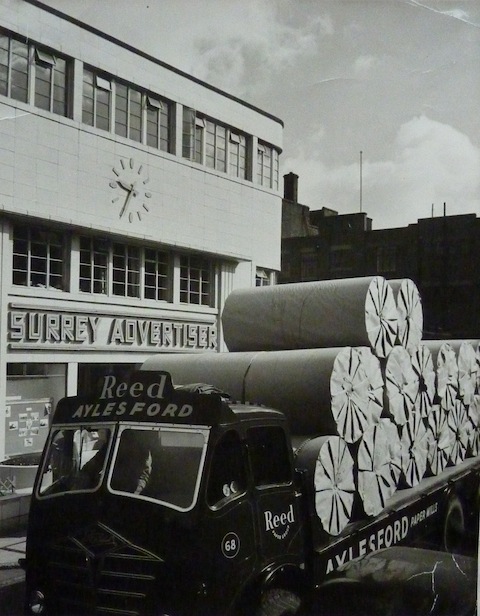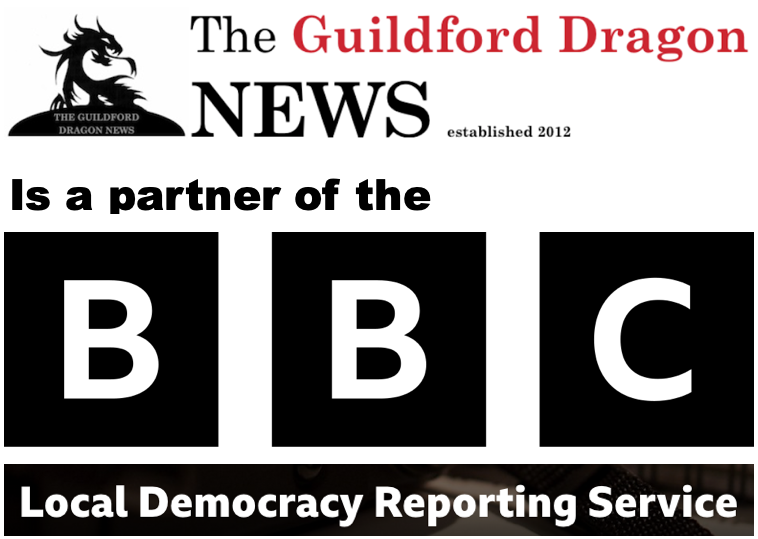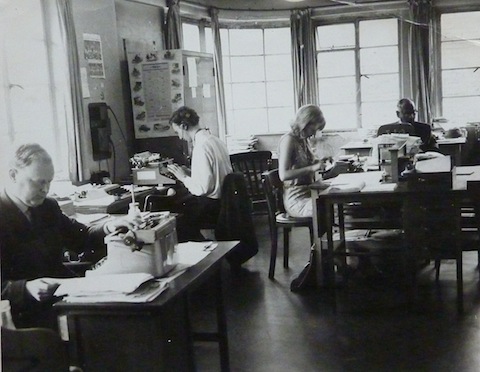 Abraham Lincoln
If given the truth, the people can be depended upon to meet any national crisis...
Abraham Lincoln
If given the truth, the people can be depended upon to meet any national crisis...
 Guildford news...
for Guildford people, brought to you by Guildford reporters - Guildford's own news service
Guildford news...
for Guildford people, brought to you by Guildford reporters - Guildford's own news service
Memories of Life In Newspapers
Published on: 26 May, 2019
Updated on: 31 May, 2019
Guildford Dragon contributor Dave Reading was 18 when he began working as a journalist in Guildford in 1965. We persuaded him to relate a few anecdotes from the old days that he would rather have kept secret.
In the world of the media, there are giants who stand out as trail-blazers. Woodward and Bernstein uncovered the Watergate scandal; John Pilger told the world about the suffering of the Khmer people; and of course there is Rupert Murdoch, the global tycoon who changed the face of newspapers. But then there are also the little stories of journalistic life…
When I walked into the Surrey Advertiser building in Martyr Road – a grand art deco style structure with cream-coloured tiles – I was overawed by the occasion. It was September 1965.

The Surrey Advertiser’s office and print works in Guildford with a newsprint delivery lorry outside in Martyr Road.
This was my first job after leaving school and I was entering a world inhabited by larger-than-life characters whose hard-drinking was legendary and where you could hardly see across the room for cigarette smoke.
During a long newspaper career that followed, I had some unforgettable experiences: interviews with some of my rock ’n’ roll heroes, being present at the unveiling of the Harrier Jump Jet at Kinloss and, as a sub-editor, following the story of the 1972 Olympic massacre from the moment it kicked off.
But strangely enough, it’s the little things that stand out most clearly – probably because of the embarrassment factor.
On my first morning as a “cub reporter” in the Surrey Ad newsroom I was terrified. Everyone else seemed to know what they were doing.
Phones jangled, skilled hacks talked in brash, confident voices, and there was a feeling, rarely discussed, that we were all on a mission to do important things.
The news editor, a middle-aged veteran named Ted Adams, sat in a little glass box, from where he directed the day’s events.
When his glass door opened and he handed me my first assignment I went hot all over. The word assignment suggests it was a big story like an interview with the Great Train Robbers.
Actually he wanted me to telephone an 82-year-old lady named Gladys whose cat had just won a rosette at a village show. I grasped the piece of paper bearing her phone number and looked around the room.
“But they will all hear me,” I thought. “They will hear my thin, nervous voice. They will hear my dumb questions and wonder how on earth I got the job.”
I picked up the phone and looked at the reporter sitting opposite. He seemed to be willing me to fail, or so I thought. I put the phone down again.
There was only one solution. I felt in my pocket for a handful of coppers. I got up. I left the building. I walked 100 yards around the corner. And I did my first interview as a newspaper reporter from a public phone box.
Incident number two happened a few weeks later. The job I was given entailed phoning the president of a village Conservative women’s association to get a report of their latest meeting.
Remember this was the 1960s in rural Surrey, where you could be strung up for looking like you might once have thought about voting Labour.
By now I had gathered enough courage to make calls from the office, as the job demanded. The voice at the other end sounded like the Queen’s but more scary.
She told me what had happened at their latest meeting. I wrote down every word in my little notebook. I wrote down that they had enjoyed their tea, had voted in a new secretary and had been given a talk by a Communist Party member.
That didn’t sound at all strange to an 18-year-old novice. It all went into my notebook and it all went into the paper at the end of the week.
And then the call came. They were furious. Their speaker wasn’t a Communist Party member. I had misheard the vital word. The visitor who had addressed the Conservatives women’s group was in fact a prominent party member.
I’m sure the only reason I kept my job was that more experienced journalists than me – the chief reporter, news editor, sub-editors, proof-readers – had all let the error through.
A few years later I was tasked with covering a small religious revival meeting at a church in Bedford. This provided one of the most uncomfortable moments in my career.
The service itself was a bit too happy-clappy for me, but I liked the hymns and jotted down a few notes about how religion might be just what the country needed in a time of industrial unrest, race hatred and fear of the Provisional IRA.
What I had in mind was all rather shallow, but I thought it might be just what the paper wanted.
Towards the end of the service, the preacher – a charismatic, Billy Graham type character – held up his arms and in a thunderous roar called on the whole congregation to leave their seats and come up to the altar to declare their faith and confess their sins.
Seats began to empty. There was a rush to the front. An atmosphere of jubilation pervaded the place. And then, from the front of the church, they all turned around and looked at me – a lonely figure sitting among the empty seats: a sinner in a church full of the Saved.
Not exactly an anecdote from a war correspondent, but scary in its own way.
Responses to Memories of Life In Newspapers
Leave a Comment Cancel reply
Please see our comments policy. All comments are moderated and may take time to appear. Full names, or at least initial and surname, must be given.
Click on cartoon for Dragon story: Public Asked for Views on SCC’s Proposal for Reduced Speed Limits




Recent Articles
- Crop Fire Destroys Wheat Field on the Slopes of the Hog’s Back Near Guildford
- Thames Water Announce Hosepipe Ban – But Not for Guildford
- Letter: Normandy Proposal Needs A Proper Services Audit
- Notice: Free Bereavement Support Programme
- Normandy Housing Plan Reignites Concerns Over ‘Damage To Our Community’
- Letter: The Class of 1955 Meets 70 Years On.
- Highways Bulletin: Reimagining Parking with Green Design
- Opinion: Never Have We Needed the Benefits of the Natural World More
- SCC Calls on the Government To Protect the Environment
- Two-Week Road Closure on Portsmouth Road for Gas Network Upgrade



Recent Comments
- Richard Cooke on Letter: Snail-paced Progress for Full Weir Repair
- Bethan Moore on Guildford’s First “Bike Bus”
- Andy Friend-Smith on Guildford’s First “Bike Bus”
- Peter Mills on Guildford’s First “Bike Bus”
- Des Flanders on Making History As Pewley School’s Class of ’54 Hold Their Final Reunion
- Margaret Rotherham on Guildford Festival Burst with Colour, Culture and Community Spirit
Search in Site
Media Gallery
Dragon Interview: Local Artist Leaves Her Mark At One of England’s Most Historic Buildings
January 21, 2023 / No Comment / Read MoreDragon Interview: Lib Dem Planning Chair: ‘Current Policy Doesn’t Work for Local People’
January 19, 2023 / No Comment / Read MoreA3 Tunnel in Guildford ‘Necessary’ for New Homes, Says Guildford’s MP
January 10, 2023 / No Comment / Read More‘Madness’ for London Road Scheme to Go Ahead Against ‘Huge Opposition’, Says SCC Leader
January 6, 2023 / No Comment / Read MoreCouncillor’s Son Starts Campaign for More Consultation on North Street Plan
December 30, 2022 / No Comment / Read MoreCounty Council Climbs Down Over London Road Works – Further ‘Engagement’ Period Announced
December 14, 2022 / No Comment / Read MoreDragon Interview: GBC Reaction to the Government’s Expected Decision to Relax Housing Targets
December 7, 2022 / No Comment / Read MoreHow Can Our Town Centre Businesses Recover? Watch the Shop Front Debate
May 18, 2020 / No Comment / Read More







Arthur Page
August 13, 2019 at 8:38 am
Super article.
I look back at my 18 years at the Surrey Ad with very fond memories.
Good luck.